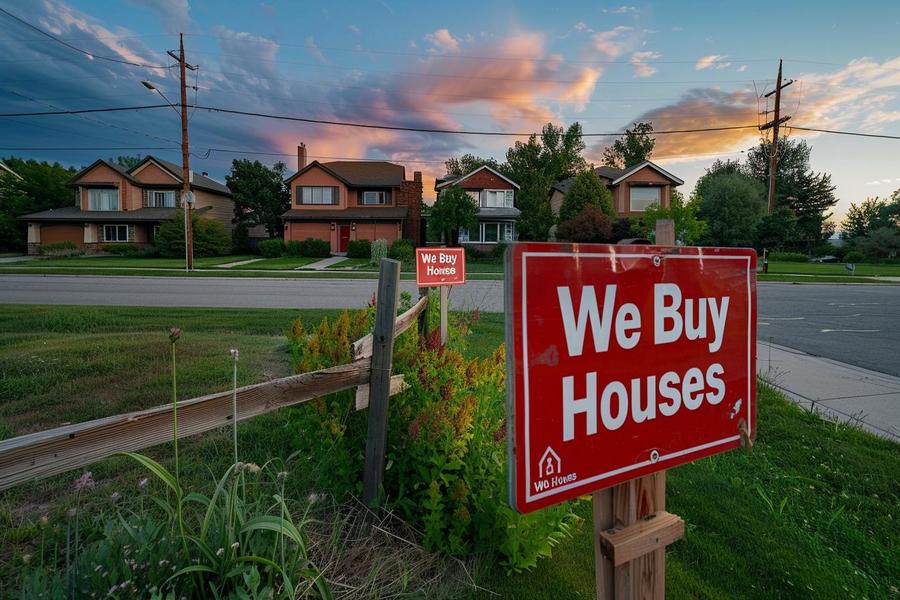Selling a house with unpermitted work? It sounds tough, but don't worry. This guide is your friend. We'll show you what unpermitted work is and why it happens. Then, we'll help you find it in your house, understand the risks, and tell you how to deal with it when selling. Want to sell as-is? We cover that too. Plus, how to fix things before selling, deal with home value and insurance, and even talk to buyers. Let's dive in and make this easy for you.
TL;DR:
- Unpermitted work refers to modifications to a home without legal approval, often done to save time or money.
- Identifying unpermitted work involves checking public records, previous disclosures, and home inspections.
- Risks of selling with unpermitted work include legal issues, potential fines, lower home prices, and voided insurance.
- Disclosing unpermitted work to buyers is required by law to avoid future legal problems.
- Homes with unpermitted work can be sold as-is, but this may lower interest and price.
- Rectifying unpermitted work can involve obtaining retroactive permits and correcting the work to meet current building codes.
- Unpermitted work can reduce home value and complicate insurance claims.
- Legal advice is recommended when selling a house with unpermitted work to navigate potential issues.
- Negotiations with buyers over unpermitted work require transparency and readiness to explain costs and risks.
- Alternative selling strategies include accepting cash offers from investors or hiring real estate agents specializing in such sales.
What is unpermitted work and why does it happen?
Understanding the Definition of Unpermitted Work
Unpermitted work means changes to a home without legal OK. Most cities or counties need a permit for big updates to ensure safety. People often skip this to save money or time. They think it's just a small job.
Common Reasons Behind Unpermitted Additions and Renovations
Many homeowners do unpermitted work by mistake. They may not know the rules. Sometimes, a handy friend or a not-so-strict contractor will suggest skipping the permit. This can feel easier, but it can cause big problems later.
Doing updates at home feels great. But taking shortcuts can cause headaches down the road. Always ask for advice from pros or check out guides on what needs a permit. This keeps you and your home safe, sound, and ready for a great future without any legal troubles.
How can I identify unpermitted work in my house?
Checking Public Records and Previous Homeowner Disclosures
To start, check public records. They often show all permits on file. If records don't match your home as it stands, some work could be unpermitted. This step is key in finding work done without approval.
Next, look at disclosures from past owners. They should list any unpermitted work they knew about. This can give you a clear look at what you're dealing with.
The Role of Home Inspections in Identifying Unpermitted Work
Now, bring in a home inspector. They check if the home meets current building codes. Inspectors can often spot signs that work was done unpermitted. They look at the quality of the work and match it against standard building practices.
Make sure the inspector knows you're especially looking for unpermitted changes. This helps them focus on areas where issues typically slip past inspection. Be present during the inspection. This lets you ask questions on the spot and understand issues better.
Remember, knowing about unpermitted work early helps you address it before it becomes a critical issue. Be proactive in your approach, and use these tips to ensure you're fully informed about your property's true condition.
Related Links:
–Selling a House with Code Violations: A Guide
What are the risks of selling a house with unpermitted work?
Potential Legal and Financial Implications
Selling homes with unpermitted work may raise legal issues. It could lead to fines or the need to tear down the added parts. Buyers may seek lower prices due to these risks. You might face costly retrofits or legal battles after the sale if not handled properly.
Effect on Home Insurance and Warranty
Unpermitted work can void home insurance. It may complicate insurance claims for damage involving unpermitted parts. Buyers may face hurdles securing coverage, affecting their mortgage qualifications. This can decrease your home's attractiveness on the market. Hence, it's vital to address these issues upfront to avoid long-term problems for buyers and ensure a smoother transaction.
How should I disclose unpermitted work when selling?
When selling your home, you must tell buyers about unpermitted work. The law needs you to share all key facts, including any unpermitted renovations or additions. This means being open and honest about the house's history and the work done on it.
Best Practices for Disclosure to Prospective Buyers
Start with a full list of updates and repairs you or previous owners have made. Check if all had the right permits by getting records from city or county offices. If you find unpermitted work, include this information in your property disclosures. This list goes to all potential buyers.
It helps avoid legal issues later. Be clear about what parts of the home may not meet local building codes. This step shows you are upfront, which builds trust with buyers.
The Importance of Transparency and Honesty
Being honest about unpermitted work can actually protect you. It prevents buyers from coming back with legal action for not telling them about property flaws. Transparency builds trust and can make buyers more comfortable with their purchase.
Even if it seems easier to skip mentioning unpermitted work, doing so can lead to bigger problems down the road. If the new owners face fines or must fix code violations, they could look to you for causing these issues.
In short, clear disclosure of unpermitted work is crucial when selling your house. It guards against legal trouble and assures buyers about what they're getting into. For more detailed guidelines check out Selling a House with Unpermitted Work.
Can I sell a house with unpermitted work as-is?
What It Means to Sell a House As-Is
Selling your house as-is means buyers get it in its current state. This includes all the good and all the issues, no fixes from you. Selling as-is can be a simple way to avoid the hassle and expense of making repairs before selling.
Pros and Cons of Selling As-Is with Unpermitted Work
There are both good and bad sides to selling your house as-is, especially with unpermitted work. Pros: You save money and time by not fixing things. Selling as-is might attract flippers or investors who don't mind the work. Cons: Fewer regular homebuyers might be interested. You might have to accept a lower price. Selling a house with work not approved by the city can scare some buyers away. They worry about safety and extra costs later.
Even with these issues, yes, you can sell a house with unpermitted work as-is. It's about setting the right price and being honest with buyers. Make sure to tell buyers about the unpermitted work. This way, they know what they're getting into. For more on this, check out this guide on selling a house with unpermitted work here.
Being upfront will help avoid problems later. It can make the sale go smoother. Plus, it keeps you out of legal trouble. Buyers appreciate knowing the full story. They can decide if they're up for the challenge or not. It's all about trust and honesty in selling homes as-is.
What steps can I take to rectify unpermitted work before selling?
Obtaining Retroactive Permits for Unpermitted Work
You may fix unpermitted work by getting a retroactive permit. This starts with visiting your local building department. Here, you show them your property plans. They tell you what inspections you need.
For most homeowners in areas like Los Angeles or Miami, this process involves a detailed review of your home’s current state against the local building codes. Expect to pay fees. These vary by county and city. Some places might want plans drafted by a pro.
The Process of Correcting Unpermitted Work
Start by listing all the work done without permits. This might include additions, electrical work, or plumbing that were installed outside the local code requirements.
Next, hire qualified professionals to bring everything up to code. This could mean redoing some work. For example, in cities like Denver or Austin, contractors often have experience in upgrading unpermitted renovations.
If needed, structural, electrical, and plumbing inspections will follow. Pass these, and your local office will issue a certificate of approval. This proves your compliance.
For a deeper dive into managing unpermitted renovations, explore this guide on selling a house with unpermitted work. It offers helpful steps on approaching this tricky aspect of home selling.
How does unpermitted work affect home value and insurance?
Evaluation of Home Value with Unpermitted Additions
Unpermitted work can lower home value. Why? It poses risks such as safety issues. Buyers fear potential costs of fixing or getting permits later. Unpermitted room additions can seem tempting. Yet, they often lower the home's market appeal and price. Cities like Los Angeles and Miami are strict about this. If you own a house in these cities, it's worse. Buyers and agents always look into permit issues first.
Insurance Risks and Policy Adjustments for Unpermitted Work
Unpermitted work can void your home insurance. "What does that mean?" you might ask. It means if damage links back to unpermitted work, insurance won't cover it. For example, a bad wiring job causes a fire? No coverage if the job had no permit. This is common in many areas, including suburbs of Chicago and small towns like Boulder. People often miss checking these details. Always check your insurance policy for specific clauses about unpermitted work.
Should I get legal advice for selling a house with unpermitted work?
When to Consult a Real Estate Lawyer
Yes, you should get legal advice when selling a house with unpermitted work. This keeps you safe in legal terms. A real estate lawyer can provide options to manage or remove legal risks from unpermitted work. They make sure you follow local laws for selling houses.
Let's talk about why a lawyer matters. In many places like Phoenix, Las Vegas, or Chicago, rules about house sales are strict. If you sell a home with unpermitted changes, you could face big fines. A lawyer can check if the house breaks any laws. They can also help fix these problems before you sell. For example, they might suggest getting a late permit for added sections of the house.
Mitigating Legal Risks When Selling
Mitigating risks means lowering the chance of legal problems. Here are some steps:
- Review the House's History: Check old records to see what work happened. This helps identify what was done without permits.
- Correct or Disclose Unpermitted Work: You can either fix the unpermitted work by getting permits or just tell buyers about it. Transparency is key here.
- Ask for Legal Help: Always better to ask for help from a lawyer who knows about real estate laws in your area.
Use these tips from a trusted real estate blog to ensure all needed documents are ready. This proves you are selling responsibly. Remember, avoiding legal trouble helps both you and the buyer. It makes the sale process smooth and stress-free.
How to negotiate with buyers interested in a property with unpermitted work?
When selling a home with unpermitted work, price talks can get tough. You must be clear, fair, and ready to explain a lot. Start by setting a fair price. This accounts for any risks the buyer takes on due to the unpermitted work. It's possible they may need to invest more into the house to cover these issues.
Strategies for Price Negotiation
One good tactic is to offer the house at a lower price from your end. This can pull in buyers looking for a deal. Yet, make sure this cut isn't too steep. You don’t want to lose out more than needed. You can check out some handy tips for selling a house as is on Orchard's blog.
Here's a quick rundown for setting up the initial price:
- Look at similar homes in your area that are up to code.
- Subtract the estimated cost of getting permits and rectifying the unpermitted work.
- Add a buffer to cover additional unexpected expenses.
When a buyer shows interest, hear them out. They might ask for repairs or a lower price based on what they'll have to fix. Be ready to discuss these points but hold firm on what makes financial sense for you.
Managing Buyer’s Expectations and Requests for Repairs
You need to manage expectations ideally from the start. Make all the unpermitted work known upfront. This transparency can build trust and pave a smoother negotiation path. Consider these steps:
- Give a full list of unpermitted projects to buyers during house showings.
- Offer them an understanding of potential costs they might face.
- Discuss openly if you're willing to take on some of those costs or if the price reflects as-is.
In discussions, keep focus. Talk through each concern based on its merit and cost. Aim for a resolution that makes both you and the buyer feel like they’ve come out fairly. Keep the communication open and factual, it helps in maintaining a good relation even through tough negotiations.
What are alternative selling strategies for homes with unpermitted work?
Considering Cash Offers from Investors
If you own a home with unpermitted work, consider cash offers from investors. These buyers often look for homes they can renovate and flip. They usually buy homes "as is." This means they might not need you to fix the issues from unpermitted work. This method helps avoid the stress of bringing your home up to code.
The Benefits of Hiring a Real Estate Agent Specialized in Such Sales
Hiring a real estate agent with experience in selling homes with unpermitted work is a wise move. They know how to deal with the challenges that come with these sales. They also connect with the right buyers who are open to homes with permit issues. With their help, you can navigate the sales process easier and might secure a better deal.
These agents often have a strategy in place to deal with potential setbacks. For example, they highlight the pros of the property to offset unpermitted work concerns. They can even help you in preparing your house for sale to add value.
Both methods provide effective approaches to manage the sale of a home with unpermitted work. They also help in reducing the possible financial and legal risks involved. Choose based on your personal situation and how much effort and resources you want to invest in the process.
We covered a lot about unpermitted work, from what it is to how to deal with it when selling your house. Remember, honesty and transparency with buyers are key. If you find unpermitted work, weigh your options carefully. You might fix it, sell as-is, or consult a lawyer. Selling to investors like us, Eagle Cash Buyers, could be your hassle-free path. We understand the ins and outs of such properties. Always aim for a solution that protects your interests and keeps the sale moving smoothly.















